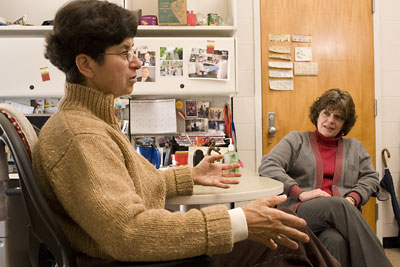Cornell provides resources for staff who care for elderly, sick relatives
By Marguerite Spencer

"If employees who are taking care of elderly relatives feel they have the support of their employer, they will be more productive, more loyal. With some flexibility, there could be less absenteeism and greater retention of staff," says dependent care consultant Eileen McCoy Whang of Cornell's Office of Workforce Diversity, Equity and Life Quality (WDELQ).
For the past year and a half, this area of the Division of Human Resources has been offering the Cornell community various forms of assistance in taking care of children as well as relatives who are elderly, sick, disabled or have special needs.
Among the program's most important initiatives is the Caregivers Support Network that Whang organizes to help faculty members, staff and students share stories and advice about looking after elderly parents or spouses. The group, which meets once a month, is aided by counselor Cindy Glanville of the Employee Assistance Program, who addresses the emotional concerns of network members.
Andrea Dutcher, for example, director of the Helen A. Newman Recreational Facility, is the primary caregiver for her elderly parents who live more than three hours away in Canton, N.Y. Dutcher's 91-year-old father suffered a major stoke in 2004 and her 85-year-old mother looks after him in their home. Dutcher, who joined the Caregivers Support Network last October, has gained support from the group for the practical and emotional difficulties she faces in looking after her parents, who refuse to relocate closer to where she lives and works.
Dutcher says the group is helping her learn "how to compartmentalize," so that she can see her caregiver role as only one part of her life, "so that it doesn't become all-consuming." Participating in the network, she says, is helpful because the people "are safe and welcoming. You feel that you are not the only person in the world facing these challenges."
Cornell families giving care
WDELQ is offering the following events this spring to Cornell faculty, staff and students who are taking care of elderly or ill adults. All take place in 304 Duffield Hall from noon to 1 p.m. unless otherwise noted:
Feb. 5: "Share the Care -- Creating a Network for Those in Need": After their own experience with the major illness and expanding needs of a close friend, two women share an informal model they have developed for organizing a care group that meets the individual's needs and doesn't burn out the caregiver. Visit http://www.sharethecare.org.
Feb. 12: "Finding Quality Care for Seniors": A presentation of a variety of senior care options and how to choose the best one for your loved one.
Thursdays: Feb. 19, March 19 (354 Duffield), April 16 and May 21: Meetings of the Caregiver Support Network. Cindy Glanville, MSW, LCSW, senior clinician and workplace consultant for the Employee Assistance Program, and Eileen McCoy Whang, dependent care consultant for the Office of Workforce Diversity, Equity and Life Quality, will facilitate.
To register, contact Eileen McCoy Whang at 255-1917 or emw76@cornell.edu.
Cornell also offers referrals to local resources in Tompkins County, such as to the Office for the Aging, which Whang rates as "excellent." Whang also helps Cornell families find resources outside of Ithaca. "I will find out what is available in another location and, if the family wants, will do some of the legwork for them," she says.
Through a series of e-mails to established e-mail lists, WDELQ updates Cornell caregivers on such useful information as the many workshops Cornell offers. [See box below] Cornell also helps provide child care for visiting faculty and conference attendees.
Both Whang and Dutcher stress the importance of flexibility in meeting caregiver demands. When her father fell ill, Dutcher took several days off a week for 14 weeks to get her parents resettled.
"I'm fortunate that in my particular job, I can have that flexibility," she says.
Whang noted that her WDELQ colleague, associate director Michelle Artibee, works with supervisors and employees to tailor a flexible work schedule to accommodate the demands of both caregiving and the workplace.
"Many people have said they're so pleased that Cornell has this commitment to helping employees and students balance their work/life needs and that the university cares enough to make these services available," says Whang.
She urges Cornell faculty, staff and students who need help caring for family members to visit Cornell's Human Resources Web site to learn about Cornell's wide range of services at: http://www.cornell.edu/workLife/balancing/dependentcare, or to contact her directly at WDELQ, 160 Day Hall, 255-3976; TDD, 255-7066.
Marguerite Spencer is HR communications specialist in the Division of Human Resources.
Media Contact
Get Cornell news delivered right to your inbox.
Subscribe